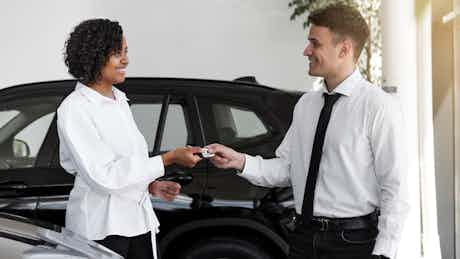What’s the difference between a registered keeper and the owner of a car?
July 03, 2025 by Siobhan Doyle

The registered keeper and the owner of the car are usually assumed to be the same thing, but this isn’t always the case. So, what’s the difference?
Are you wondering what the difference is between the registered keeper and the owner of a car? In this guide, we’ll break down the basics of registered owner vs registered keeper and explain the key difference between owner and registered keeper, so you know exactly who’s responsible for what.
Who is the registered keeper of a car?
The registered keeper is the person who looks after and uses the car on a daily basis. They are the name listed on the car’s V5C logbook, but this doesn’t mean they legally own the car, it just shows who is responsible for it.
Responsibilities of the registered keeper
- Keeping the car taxed and insured.
- Making sure the car has a valid MOT (if needed).
- Informing the DVLA about any changes, such as address or if the car is sold.
- Being responsible for any parking or traffic fines linked to the car.
Remember, you can buy a brand new or used car right here on Carwow. And you can also sell your car, too. We’re here to help you through every step of your car-changing journey.
Who is the owner of a car?
The owner is the person or company who bought the car or got it as a gift. Sometimes the owner and the registered keeper are the same, but not always such as with company cars or in the cases of some finance agreements. If you own the car but someone else is the registered keeper, make sure the paperwork is correct so you don’t end up with any unexpected fines.
Responsibilities of the owner
- Keeping proof you actually own the car, such as a receipt or bill of sale.
- Checking the registration documents show the right details.
- Knowing you could be on the hook for fines if the info isn’t right.
What’s the difference between the registered keeper and the owner?
The registered keeper is the person who looks after the car day-to-day and handles things such as tax and MOT. The owner is the one who legally owns the car, usually because they bought it. Often, the registered keeper and owner are the same, but with company cars, for example, the company is usually the owner while the employee is the registered keeper. The registered keeper is usually the one who gets letters and notices from the DVLA and other authorities about the car.
How to change the registered keeper of a car
To change the registered keeper of a car, you just need to contact the DVLA to let them know, the same as you would if you were selling the car. This can be done by post or online.
To do it by post, you’ll need the V5C logbook. Simply fill out the section for transferring the vehicle to a new keeper, along with the green new keeper slip.
Tear out the green new keeper slip and give it to the person you’re transferring the car to and post the rest of the document to the DVLA. The new keeper will get a fresh logbook in the post in their name.
Doing it online is a bit easier and quicker. You’ll still need your V5C logbook as you need the 11 digit reference number and the new keeper slip. All you need to do is go to the gov.uk website and fill out the form to transfer ownership, and a new logbook will be sent out to the new keeper.
In the meantime, give the new keeper the filled out green slip from the current logbook and destroy the rest of it.
How to change the owner of a car
When you sell your car, you’ll need to give the buyer some kind of receipt or invoice as proof that they are now the legal owner of the vehicle. This should contain the car’s make, model, colour, registration number and VIN, along with the date of sale, the amount paid and the method of payment.
Equally, if you are buying a car you should make sure you get the same document and store it in a safe place. You should also ask the seller if they have the invoice from when they bought the car as well to make sure that they legally own it. You are within your rights to reject the V5C as proof of ownership.
Registered keeper vs owner FAQs
Is the registered keeper the same as the owner?
No, the registered keeper and owner of a vehicle are not always the same. The registered keeper is the person or company responsible for the car day-to-day and listed on the V5C, while the owner is the one who bought or was gifted it. They’re usually the same, but can differ, such as with company cars where the company owns it and an employee is the keeper.
Can you be the registered keeper but not the owner of a car?
Yes, you can be the registered keeper without owning the car. This usually happens with company car schemes, where the company owns the vehicle but you’re the registered keeper.
Can the owner of a car change the registered keeper?
Yes, the registered keeper can change when a car is sold or ownership changes. You will need to tell the DVLA by filling out the “new keeper” part of the V5C logbook and sending it in. The new keeper gets the updated V5C, and the old keeper gets confirmation.
How can I find out the registered keeper of a vehicle?
To find out who the registered keeper of a car is, you’ll need to contact the DVLA using form V888. You’ll have to explain why you need the info, such as if there’s been an accident or you’re trying to track down the owner of an abandoned car. Bear in mind that the DVLA will only share details if your reason is valid.
Is the V5C a proof of ownership document?
No, the V5C isn’t proof that you own the car – but it does show who the registered keeper is. But being the registered keeper doesn’t always mean you’re the legal owner. If you need to prove ownership, you’d usually use the original purchase receipt or invoice.
Car change? Carwow!
Looking for a new set of wheels? With Carwow you can sell your car quickly and for a fair price – as well as find great offers on your next one. Whether you’re looking to buy a car brand new, are after something used or you want to explore car leasing options, Carwow is your one stop shop for new car deals.
Click here to follow us on WhatsApp, where you can keep up-to-date with all the latest news, reviews, advice guides and videos.















